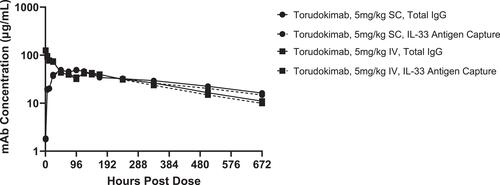Figures & data
Table 1 Characterization of Framework Library Antibody Variants. Relative Binding for Each Analytical Assay Was Evaluated as Follows: Low Binding (+), Moderate Binding (++), High Binding (+++)
Table 2 Binding Kinetics and Affinity of IL-33 Monoclonal Antibodies at 37°C
Figure 1 SPR sensorgrams for the binding kinetics of LSN3348360 and torudokimab to human (95–270) and cynomolgus (95–270) monkey IL-33 at 37°C. The engineering of LSN3348360 to produce torudokimab resulted in improved binding to cynomolgus monkey IL-33. Antibodies were captured on the surface of a CM4 chip with immobilized Protein A and different concentrations of IL-33 were injected to assess binding kinetics. Double reference subtracted binding sensorgrams are shown.
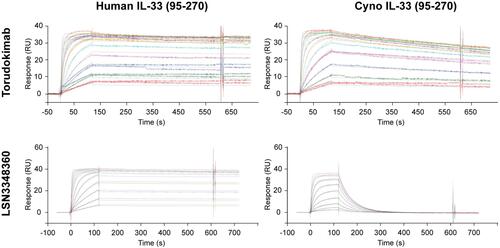
Figure 2 (A) Torudokimab completely inhibited 30ng/mL human IL-33 (95–270) from binding to ST2 in a blocking ELISA assay with an IC50 of 3.7nM. Results are expressed as IC50 (half maximal inhibitory concentration) and calculated using a 4-parameter sigmoidal fit of the data (GraphPad, Prism). (B) Torudokimab completely inhibited the cleaved mature form of human- and cynomolgus monkey-, but not mouse-, rat- or rabbit- IL-33 induced NFκB activity in a dose-dependent manner. The GEC-NFkB luciferase cell line was treated in biological triplicates with 2.5 ng/mL IL-33 (95–270) in the presence of the antibodies for 6 hours before luciferase reading was done. IC50 showed that torudokimab inhibited human IL-33 (95–270) at 0.330 nM and cynomolgus monkey IL-33 (95–270) at 1.918 nM. Whereas soluble ST2 (sST2), the positive control, inhibited human IL-33 at 0.426 nM and cynomolgus monkey IL-33 at 0.175 nM. Results were calculated using a 4-parameter sigmoidal fit of the data (GraphPad, Prism). Results are representative of three independent experiments.
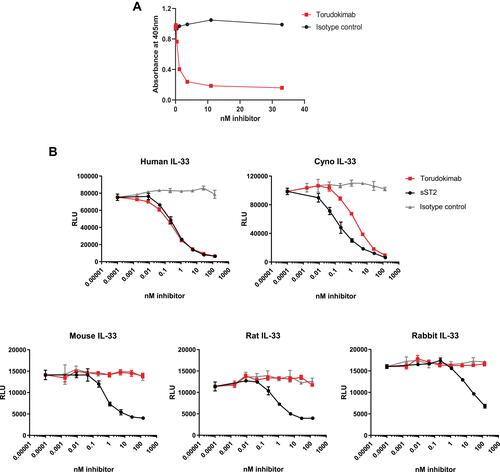
Figure 3 Torudokimab completely inhibits human IL-33 induced GM-CSF secretion from human mast cells in a dose-dependent manner. Mast cells were treated with 10ng/mL IL-33 (95–270) for 16 hours and the assay was performed in biological triplicates. The inhibition of human IL-33 with torudokimab was lower than the positive control soluble receptor (sST2). Negative isotype control antibody did not inhibit IL-33 induced GM-CSF secretion. *p < 0.05 torudokimab compared to isotype control (t-test performed by GraphPad, Prism). Results are representative of two independent experiments.
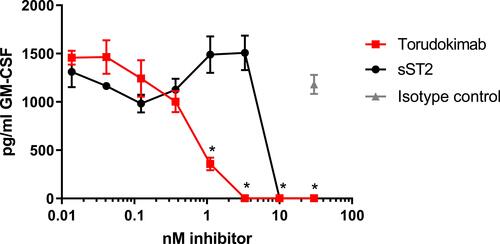
Figure 4 Torudokimab inhibits IL-33-induced production of mouse IL-5 in vivo in a dose dependent manner (individual mouse scatter plot plus mean). C57BL/6 mice (n=5) were injected intraperitoneally with 0.94 mg/kg, 0.282 mg/kg or 0.094 mg/kg (10-fold, 3-fold or equimolar amounts relative to human IL-33 respectively) of torudokimab or with an isotype control antibody at 0.94 mg/kg (10-fold relative to human IL-33). One day post-injection, mice were challenged by intraperitoneal injection of 0.025 mg/kg of human IL-33. Six hours post-human IL-33 challenge, mice were sacrificed, and serum was collected. The negative isotype control antibody did not inhibit the human IL-33-induced production of mouse IL-5. Results are representative of two independent experiments. One-way ANOVA with Dunnett's multiple comparisons test was performed; ****p < 0.0001.
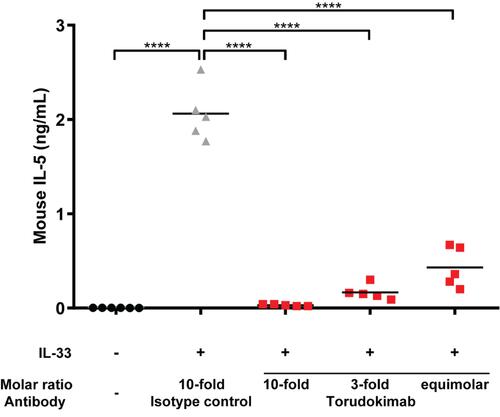
Table 3 PK of Torudokimab Following a Single 5 Mg/Kg Dose in Cynomolgus Monkeys

